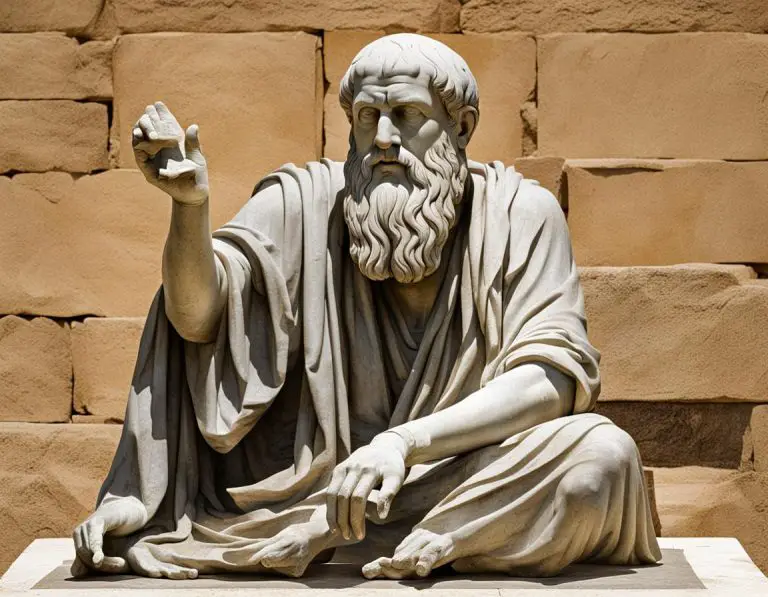Plato’s Metaphysics
Plato’s metaphysics forms the cornerstone of his philosophical teachings, grappling with the profound question of the fundamental nature of reality. Central to his metaphysical ideas is the concept of Forms, which are perfect, eternal ideals that exist beyond the physical world. For Plato, the material world that we perceive is merely a shadowy reflection of these Forms, serving as a realm of imperfection and impermanence.
In Plato’s metaphysical framework, he posits that the ultimate reality consists of unchanging Forms, which are the true essence of objects and concepts. These Forms, such as beauty, justice, and goodness, are eternal and immutable, providing a standard of truth and perfection that transcends the flux of the material world. By contemplating these Forms through philosophical inquiry and intellectual reflection, individuals can attain a deeper understanding of reality and aspire towards a higher state of enlightenment.
Delving into the Fundamental Nature of Reality
Plato’s exploration of the fundamental nature of reality is a cornerstone of his philosophical pursuits. He delved deep into the essence of existence, questioning the reality of the physical world we perceive. According to Plato, the material world is transient and ever-changing, merely a shadow of the true reality that exists beyond our sensory perceptions.
In his famous Allegory of the Cave, Plato illustrates how individuals are trapped in a world of illusions, mistaking shadows for reality. He posits that true knowledge and understanding can only be attained by transcending the limitations of the material world and delving into the realm of abstract Forms. For Plato, the ultimate reality lies in these eternal, immutable Forms that serve as the blueprints for all existence.
Plato’s Ethics
Plato’s ethical philosophy is deeply rooted in his belief that true virtue is the key to leading a morally sound life. Central to Plato’s ethics is the idea that the pursuit of knowledge leads to the cultivation of virtue. According to him, an individual who possesses true wisdom will inherently act in a just and virtuous manner. By focusing on the development of one’s intellect and moral character, Plato asserts that individuals can achieve harmony within themselves and with society.
In Plato’s view, goodness is the ultimate aim of human existence, and it is through the practice of justice and the cultivation of virtue that individuals can attain this highest good. He argues that living a just and virtuous life not only benefits the individual but also contributes to the well-being of the society as a whole. Through his ethical teachings, Plato encourages individuals to strive for excellence in character and conduct, believing that by following the path of virtue, one can attain true happiness and fulfillment.
Investigating Virtue, Goodness, and Justice
In Plato’s exploration of virtue, goodness, and justice, he delves into the core elements that define a morally upright individual and a just society. The idea of virtue, for Plato, goes beyond mere obedience to rules or societal norms; it is about embodying a deeper sense of moral excellence and living in accordance with one’s true nature. Plato emphasizes the importance of self-reflection and self-awareness in cultivating virtue, pointing towards internal qualities such as wisdom, courage, moderation, and justice as essential virtues to strive for.
Moreover, for Plato, goodness is intrinsically linked to the pursuit of knowledge and the realization of the ultimate truth. He posits that true goodness arises from a deep understanding of the Forms, which represent the ideal and unchanging essence of concepts such as justice, beauty, and truth. By aligning oneself with the Forms through philosophical contemplation and intellectual inquiry, one can attain a higher state of moral purity and goodness. Plato’s vision of justice mirrors this pursuit of the Forms, suggesting that a just society is one where individuals harmonize their inner virtues with the external world, creating a balanced and fair community where each person fulfills their unique role with excellence.
Plato’s Theory of Education
Plato’s theory of education is deeply rooted in his belief in the importance of knowledge and wisdom in shaping a just and harmonious society. He viewed education as a means to cultivate individuals who possess not only intellectual prowess but also moral excellence. For Plato, the ultimate goal of education was to lead individuals towards the pursuit of truth and the realization of their inner potential.
In Plato’s ideal educational system, individuals would undergo a rigorous process of intellectual and moral development. The curriculum would be carefully designed to instill virtues such as wisdom, courage, moderation, and justice. Through this holistic approach to education, Plato aimed to create a harmonious society where individuals would strive to excel not only for personal gain but for the betterment of the collective whole.
Understanding the Role of Knowledge in Society
Plato believed that knowledge was the cornerstone of a just and harmonious society. In his ideal state, individuals were classified based on their innate abilities and guided towards the appropriate education. Guardians, chosen for their wisdom and altruism, were tasked with the crucial role of governing the society. It was essential for the rulers to possess a deep understanding of the Forms, as this knowledge allowed them to make just decisions for the benefit of all citizens.
Furthermore, Plato emphasized the importance of education in shaping individuals who would contribute positively to the community. He proposed a rigorous educational system that focused on mathematics, philosophy, and physical training. Through this holistic approach, individuals would develop both intellectually and morally, enabling them to fulfill their civic duties efficiently. Overall, Plato viewed knowledge not only as a personal asset but as a communal responsibility essential for the betterment of society as a whole.
Related Links
Review: Exploring Plato’s Philosophical Ideas
How to Understand Plato’s Theory of Forms
